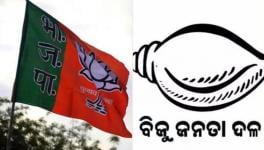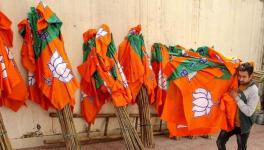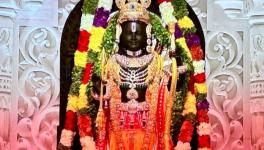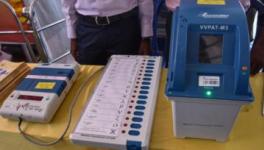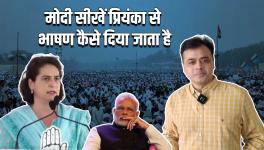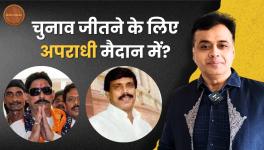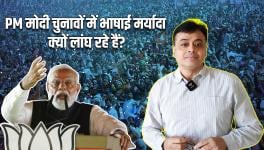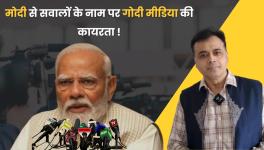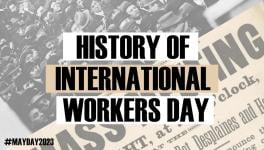Blanket Ban on Opinion Polls is Insensible
Newsclick in conversation with senior political journalist Paranjoy Guha Thakurta discusses the Election Commission’s recent request to the Centre to ban opinion polls from the date of notification of an election. Paranjoy Guha Thakurta considers it insensible to ban opinion polls for a nation, which believes the freedom of expression to be a fundamental right. He points out to inculcating transparency in the process of conducting opinion polls and disseminating their results as the remedy to this over-reaction. Opinion polls can be and in fact have been manipulated but Thakurta insists that a statutory intervention would be unnecessary if opinion pollsters and the media jointly put together a voluntary code of conduct that everyone adheres to.
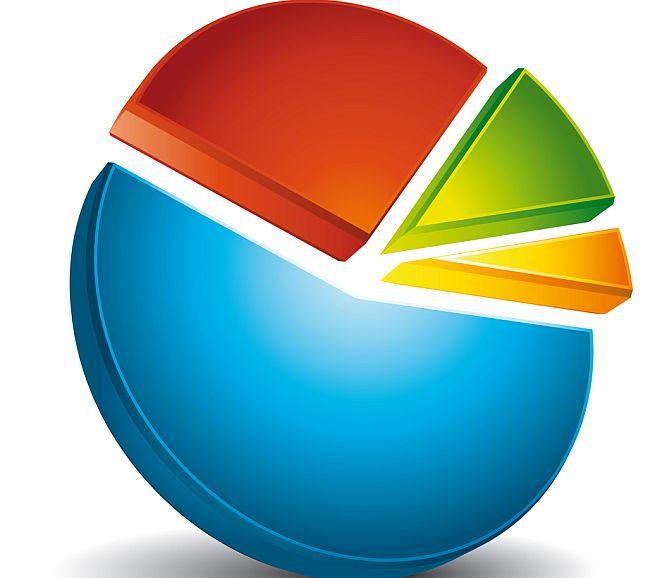
Rishab Bailey (RB): Hi Paranjoy. Thanks for being with Newsclick. First a very, very basic question. As a journalist, what do you think is the value of an opinion poll? A cynical person might just say that it's another gimmick for the media to play around with, you know, so you can avoid doing real journalism. Do you think there's actually any value in opinion polls?
Paranjoy Guha Thakurta (PT): You know there are opinion polls and opinion polls. I do believe there's considerable value in opinion polls. There have been been opinion polls in this country which have been able to very very accurately predict the outcome of elections at the national level. And there also have been opinion polls which have been terribly wrong. I mean, I can give you two random examples: the fact that Mrs Indira Gandhi would return to power in January 1980 was only anticipated by an opinion poll that was conducted by people like Dr Pranoy Roy, David Butler and Dr Ashok Lahiri. When you go back to what happened, say, in 2004, almost all the opinion polls went completely wrong and they didn't anticipate that the Bhartiya Janata Party led National Democratic Alliance would get defeated. In fact many opinion polls also did not predict that in 2009, the United Progressive Alliance government would return to power. So, opinion polls can accurately predict and opinion polls can go terribly wrong. Now, what is the value of these opinion polls? As a journalist, if I am writing about the political situation, say in Delhi, where elections are supposed to take place, I go and meet 15 people or 20 people and on the basis of my understanding, I choose my random sample and then write an article. I have become an opinion pollster; which is not the same thing as saying that if a particular agency, say, interviews 1000 or 2000 or few thousand people through a structured questionnaire and then arrives at the same conclusion as I do, speaking to 10 or 15 people, we might be both of the same view or of different view; the short point is that if you do believe in Article 19 (1)(a) of the Constitution of India that says that freedom of expression is a fundamental right, then I don't think it makes any sense to ban opinion polls as has been suggested. I think the issue is how do you make the working of opinion polls and their publication and their public dissemination done through a far more transparent process. I think the key issue is, those who conduct opinion polls - do they disclose enough; do they tell their viewers, their readers, their listeners, all that has gone behind these opinion polls including those who sponsored that opinion poll, including whether or not, they have an affiliation to a particular political party or not. The short point is, yes, just as journalists can go wrong and we allow our own subjective perceptions or opinions to cloud our judgment, opinion polls can also be manipulated and in fact have been manipulated. But, that is in itself not a reason why you should ban them altogether.
RB: 14 of the 15 parties who actually responded to the Election Commission have asked for a ban on opinion polls stating, as you just mentioned that they could be unscientific, they there's no transparent process, that they could be manipulated and could lead to skewing of votes. Again, as you pointed out, you have had parties like BJP which have changed their stance I think over the years and are now saying that 19 (1)(a) should be protected and opinion polls shouldn't be banned. Don't you think there are actual dangers in having a media, you know, publishing questionable opinions as such, and how would you go about streamlining or making this procedure more transparent? Is there something we can learn from Western countries possibly?
PT: The whole issue of the Bhartiya Janata Party today saying they are in favour of opinion polls, everybody had said they are not; the CPI(M) is a little bit here, not entirely there; but what is the BJP saying? The BJP is saying that just because the opinion polls are indicating that the Congress is doing badly or the UPA is doing badly, that's why they want the opinion polls banned. But the Bhartiya Janata Party itself earlier, some years ago, had also supported this whole idea that you should not have opinion polls. Point 1. I think there is an element of hypocrisy in what the BJP is saying. But I think, the more important issue is, when do you stop the dissemination of opinion polls? Is it from the date of notification of the poll, which is what the Election Commission has reportedly suggested in a letter to the..
RB: But you do agree that it can skew results, though?
PT: No, no. One minute. As of now, people are not at all sure; I mean veteran opinion pollsters from across the world, including people like David Butler and others, have argued that it could cut both ways. You could have what is called a bandwagon effect. That means if a particular opinion poll shows a particular party is winning, more people would want to go along with that and even if undecided earlier, they would vote with that party because of that bandwagon effect. Now this may not matter when the verdict is decisive. But this may matter, in elections which are contested or keenly contested, where a small proportion or a small number of voters who were earlier undecided, get influenced by an opinion poll. That is one point. The other view point says that you could have an underdog effect. That you find actually an opinion poll showing a particular party is leading, then the voter concerned says no, I want to favour the underdog and give the underdog a bigger chance to have a more keen election or a more keenly contested election. Now, there is no concrete evidence either way. If at all there is any evidence, it is probably pointing to a bandwagon effect. Again, it doesn't matter when the verdict is decisive. It matters only in situations where a small proportion or a small number of floating voters would make a difference. Now again if you look at what is international experience, I really do not know, how other countries work? What the AIADMK has said in its formal communication to the Election Commission here; they said many a 16 of the 27 countries of the European Union have some sort of a banning on reporting the opinion polls. Once again, from when to when? Once you say, from the date of notification, date of announcement, in India because of the size of the country, because elections are phased over a period of time, because in the same state, you know, you can have elections on more than one day, which is why even when that happens all the results are finally announced on particular day. Now, even in such situations that we have, should it be, supposed you want to stop the reporting of opinion polls, lets drop the word ban, should it be from the date of notification or should it be 48 hours before the actual polling takes place. Now, in India, we have a situation that from the date of notification, of a particular election by the Election Commission, by the time that entire process is over, it could vary from a few weeks to a few months time. Now, that is really the whole problem. Now, this whole issue of when do you stop reporting? Ok, you don't have exit polls. Why? What is an exit poll? When people are coming out of a polling booth, they say, ok, we voted for A,B and C. You are assuming people are a) truthful. Secondly you are assuming that all the elections are held on time, which never happens. Then the question is, we have a curious anomaly now that exists in our country. Television channels are prohibited from reporting election related news 48 hours from the time the polling begins, say 8 am or 9 am on a particular day till that whole election process is complete, say at 4 o'clock or 5 o'clock or till the number of people who are standing in queue at a polling booth, nobody is left to vote. Ok. Now, this particular restriction which is under Article 19 (2), which is supposed to be a reasonable restriction, is applying only to the electronic medium, only to television. Curiously, it doesn't apply to the print media, for an anomaly which has to be rectified. Either the Election Commission or somebody has to move the Supreme Court. Because you have a curious situation where on the morning of the poll, you can have a particular, so-called opinion poll printed, which indicates that the wind is blowing in favour of one party or the other. This has actually happened because you have corruption in the media, there was a prominent newspaper, Hindustan which had printed on the day of polling, an article which some people may have thought was a news item, but was actually a paid for advertisement which indicated that there was a kind of wave in favour of the Congress party. The following day, the same newspaper said no, this was not actually a news item, but was a paid for item, a sponsored item, by which time, polling was over. Now, there have been such instances, but despite the fact that there are a few rotten apples in the basket, I am arguing here that don't throw away that baby with the bath water. There are problems, there is paid news, there is corruption within the media, opinion pollsters have particular political affiliations which they do not disclose; there is corruption but don't have a blanket ban on opinion polls; and if you were to stop television or the electronic medium from broadcasting news relating to the election, 48 hours before polling, have that restriction for print medium as well.
RB: So, you have actually brought out how quite a few issues are coalescing into a broader issue of how elections are covered in India. Do you actually think we need to go down the legislative route to deal with these issues in a single format and as a corollary where does this power end?
PT: This is a difficult question to answer; as difficult as trying to say how should the media regulate itself. In an ideal world, you could say self regulation is the best kind of regulation. But what do you do when within the media there are corrupt elements, there are rogue elements, what do you do with them? I think one way forward could be, that if all the opinion pollsters and all media voluntarily agree to a certain code of conduct. This code of conduct, if it is not voluntarily agreed, and there's every reason why it may not be voluntarily agreed by everybody concerned, it could nevertheless be in the form of a guideline. May be that could be one step forward, before making it a law or a rule which has statutory backing. What are these guidelines? Its not enough to say that ok your margin of error is 3 %; you duck it in fine print at the bottom of the page; you need a magnifying glass to look it ; it's not enough to say - these are the number of people we polled, and the dates and the locations or you know the socio-economic background, its also important to put out the questionnaire. In this day and age of the Internet there's no reason why all this information cannot be put on the net; even if it is not printed in a newspaper or not put out on a television channel or not broadcast on a radio channel, what could be given are the links. So those who are interested can scrutinize. Ok, dates, the kind of sampling that has happened, the kind of questions that have been asked; the sequence in which the questions have been asked. You know suppose I ask a question - do you prefer Harshvardhan to Sheila Dixit as a chief minister of Delhi. You may get one kind of response. Or you might have another kind of question – do you think Arvind Kejriwal is better than Sheila Dixit or Harshvardhan as chief minister or you can say here are 3 chief ministerial candidates, tick on the person you want or the person who you think is best suited to be the chief minister of Delhi. So the way the questions are framed and structured, the order in which the questions are made - all of these should be in the public domain and not just the margin of error and not just the number of people interviewed, and not just the dates and areas and so on and so forth – I think what is required is far greater transparency.
RB: So you won't actually believe in the need for a regulatory agency or a standardising agency, much like say, like in the UK, you have the British polling council, which I think is the apex organisation which deals with opinion polls and so on. Do you think that that is the workable system in India or that restricts journalist freedom too much?
PT: There would be a certain amount of restriction. But I think ideally if opinion pollsters and the media could come together and put together a voluntary code of conduct which everybody adheres to, and all opinion pollsters voluntarily agree and there is a considerable amount of consensus within the media and among those who conduct these opinion polls, then your problem would be solved. Then you would not need that statutory intervention. If however there is no consensus and there is no kind of a voluntary kind of set of guidelines, a kind of self regulation, a kind of self governance that comes through, then I suppose – if that cannot be worked out, then it might be better for the government of India to get its act together. You know the government of India itself conducts polls on regular basis. Major government programmes and policies are formulated on the basis of opinion polls conducted by a government organization called the NSSO – the National Sample Survey Organization. So opinion polls by themselves have nothing wrong with them. It's how well they are conducted, how sincerely they are conducted, how free of bias, how well-structured, how broad and deep the polling takes place. I think those are the real issues we need to address.
RB: Okay. Thank you Paranjoy. That's all we have time for today, and thank you for watching Newsclick.
Get the latest reports & analysis with people's perspective on Protests, movements & deep analytical videos, discussions of the current affairs in your Telegram app. Subscribe to NewsClick's Telegram channel & get Real-Time updates on stories, as they get published on our website.










